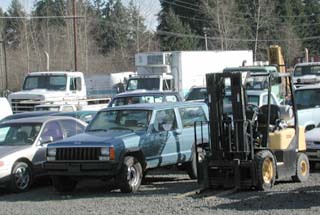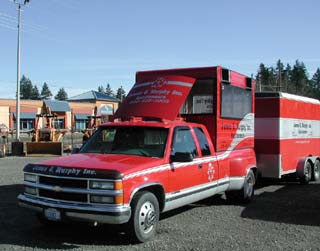
Surveys
Awards
DJC.COM
March 28, 2002
Murphy sells more than backhoes and bulldozers
Special to the Journal

Photos by Terry Stephens A mix of different types of vehicles can be found at most James G. Murphy auctions. |
Founded in 1970, James G. Murphy’s commercial and industrial auction business has become a $35 million-a-year enterprise directed by his son Tim, the company’s president, and daughter Julie Murphy-Rice, a CPA who manages the company’s operations and procedures.
James Murphy, an Edmonds resident, occasionally gets pressed into service when auction schedules get tough to handle at the company’s Kenmore location.
With an office in Keizer, Ore., the company is now the 10th largest commercial and industrial auction house in the nation, averaging 100 auctions a year. Last year, the company posted 129 auctions because of the rush of extra business from the demise of nearly two dozen dot-com companies. Many defunct dot-com enterprises invested heavily in fancy office furniture, high-end desktop and laptop computers and printers that now offer great bargains on the auction block.
From the once admired high-tech treasures of now bankrupt dot-coms to backhoes, bulldozers, sedans, pickups, old Kenworths, tools, milling machinery and vehicles seized by law enforcement agencies, there seems to be something for almost everybody. Thousands of bidders each year are enticed to James G. Murphy Co. auctions in the Northwest and across the country.
| Upcoming auctions |
|
Auctions on the James G. Murphy Co.’s agenda include its annual series of heavy equipment, truck and vehicle sales, all conducted at its Kenmore headquarters, 18226 68th Ave. N.E. A map to the site is posted on its Web site, www.murphyauctions.net.
Those auctions are set for May 4, June 15, July 27, Sept. 14, Oct. 26 and Dec. 7, all Saturdays at 9 a.m., with previews available the Friday before each auction, from 8 a.m. to 5 p.m. Other auctions posted on the Web site include machine shop equipment and tools from Mamco Machining, April 1, at 9747 Martin Luther King Jr. Way S., Seattle. |
But all of the vehicles, forklifts and rows of computers at the company’s Kenmore auction yard and warehouse are only a small part of the steady flow of items of all sizes, shapes and values that the company auctions each year. Most auctions are at clients’ sites, from closed restaurants like two Houlihan’s diners in Tacoma and Tukwila to the defunct eCash Technologies computer-filled offices in Bothell and TruDimension Manufacturing’s machine shop equipment in Kent.
Mailing lists with more than 60,000 names are divided into more than 40 specialized categories to advertise the company’s auctions to target-marketed audiences, depending on the types of items being sold. The company’s advertising department also reaches customers through trade magazines, local publications, radio, television and through Murphy’s Web site, where upcoming auctions are always posted. Now well known for its auction expertise, the company attracts a large segment of its sales through word-of-mouth promotion.
Bidders can also register on the Web to make advance bids on items, usually up until the time of the auction.
The variety of auction items is so broad now that Murphy’s auctioneers need to be ready to handle almost anything.
“The perception is that all we do is restaurants and contractors’ equipment, but we’re really so wide ranging,” said Terry Moore, a spokesperson for the company. “Last year, for instance, we auctioned office equipment, computers, jewelry, cars, home furnishings and police seizures of stereos, printers and cell phones.”
Vehicle auctions are particularly popular, especially when they include former Seattle police cars, park department vehicles and other surplus city equipment because they have been well maintained and detailed records are available. If a vehicle does have a problem, such as a bad transmission, the auctioneer lets bidders know.
Two basic rules apply to James G. Murphy Co.’s auctions: first, there is no minimum bid required and, second, everything must go, as is. Every auction offers exciting auctioneering and opportunities for great bargains, he said.
“Most people come to an auction to get something for less,” Moore said. “A minimum bid usually eliminates about half of the bidders, since the auctions are open to the public as well as businesses. It still works out well for the sellers because the energy, the adrenaline flowing through the audience will generate good prices. The competitive nature of bidding makes auctions a successful way to dispose of things.”
Some of the more unusual items auctioned by Murphy’s team have included a gold mine, a PBY amphibian aircraft and fishing boats, along with the more common array of metal shop equipment, office furnishings and electronic gear.
One of the most interesting auctions he’s seen involved efforts to recover some of the $3.7 million that a former Starbucks manager embezzled from the company. The Newport Hills woman, whose husband owned a Renton accounting firm, used the money to buy everything from cars to giant television sets, as well as vacation trips.

Mobile auctions in the Northwest mean mobile auction vehicles, such as this James G. Murphy Co. truck mounted with loudspeakers and towing an equipment trailer.
|
Police seized 34 automobiles, including a 2001 Porsche Turbo, a 2001 Chevrolet Corvette, a BMW roadster and a 1936 Mercedes replica. Also confiscated were three boats valued at $310,000, including a 47-foot Bayliner, and a stash of merchandise that made the woman’s $300,000 home almost impassable. Among the items were three Steinway pianos, five 60-inch big-screen television sets and five digital satellite systems.
“Three of the big-screen TVs were still in boxes,” Moore said. “But in the excitement of the auction one bidder paid $200 more for one of the 60-inch units than the price on the box. I tell people that if they do their research, set a price and don’t go past it, they’ll find some opportunities, if not at this auction, then at a future one.”
Auctions tend to be very competitive, he said, noting that a row of backhoes awaiting sale at the company’s Kenmore site has already drawn telephone inquiries. When several units are exactly alike the auctioneer will give the highest bidder a choice, then offer the rest to the other bidders for the same price.
Bidders can usually view auction items the day before — or a few hours before — the bidding starts, depending on the auction location and circumstances. Moore said most bidders know exactly what they’re looking for, and many bidders bring mechanics along to look at big equipment. The auction company also makes sure it has operators available to start-up trucks, backhoes or cranes during the preview period.
Payment is by cash or bank card, due by the end of the bidding day. Cash is often the preferred choice, Moore said, noting he’s seen “people buy a backhoe for $20,000 and pull out a wad of bills to pay for it ... it never ceases to amaze me.”
For further information, contact James G. Murphy Co. at P.O. Box 82160, Kenmore, WA 98028, call (800) 426-3008 or visit the firm’s Web site at www.murphyauctions.net.
Terry Stephens is a freelance writer based in Arlington. He can be reached by e-mail at features@gte.net.
Other Stories:
- How to survive the construction recession
- Sewer Rx: Clamp down on leaky pipes
- Building a 'fertile crescent' in Snohomish County
- Is this the end of differing site conditions?
- Scope creep and other scary things
- 2002: A slow year for construction grads
- Delivering the pitch after making the short list
- How a creative agency can work for you
- Volunteering: A habitat for learning construction
- Want to dispute that bid? Better act quickly
- Church rebuild strays from standard scripture
- 7 ways to recession-proof your company
- No relief for bid-shopped subs
- A lesson in constructive diversity
- Need more business? Call on Uncle Sam
- Put a cap on skyrocketing insurance costs
- Avoiding pitfalls in pipeline restoration
Copyright ©2009 Seattle Daily Journal and DJC.COM.
Comments? Questions? Contact us.